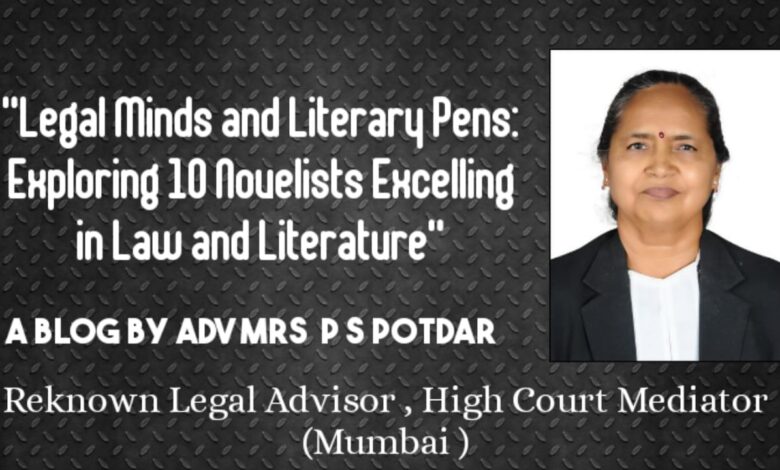
Embark on a journey through the intriguing career trajectories of ten novelists whose literary prowess intertwines seamlessly with their significant contributions to diverse legal domains, leaving an indelible mark on both literature and the legal landscape.
- John Grisham (United States):
– Steeped in the realm of Criminal Law, Grisham’s legal thrillers, including “A Time to Kill” and “The Firm,” intricately weave together his experiences as a former attorney, offering readers a vivid portrayal of the complexities within the criminal justice system.
- Pratibha Ray (India):
– Navigating the terrain of Administrative Law, Ray’s narrative unfolds not only through her literary creations but also echoes her expertise as an Indian Administrative Service officer, showcasing a unique blend of administrative law and literary finesse.
- Ian McEwan (United Kingdom):
– As a Barrister specializing in Family Law, McEwan’s novels such as “The Children Act” and “Atonement” serve as a canvas for his profound legal insights, drawing from his background as a trained barrister, particularly delving into the intricacies of family law.
- Rene Denfeld (United States):
– Immersed in the realm of Criminal Defense, Denfeld’s novels, including “The Enchanted,” derive depth from her dual roles as a licensed investigator and a death penalty defense attorney, providing readers with a unique perspective on criminal defense dynamics.
- Orhan Pamuk (Turkey):
– Navigating Intellectual Property Law, Pamuk’s literary exploration of intellectual property rights and cultural heritage in works like “My Name is Red” and “Snow” stems from his background in journalism and law, adding layers of authenticity to his narratives.
- Miriam Toews (Canada):
– Entwined with the nuances of Family Law, Toews’ novels, especially “All My Puny Sorrows,” delve into the complexities of family legal matters, reflecting her background in social work and law.
- Louis Begley (United States):
– Embracing Corporate Law, Begley’s novels, including “Wartime Lies” and “About Schmidt,” seamlessly incorporate themes of corporate law, showcasing his expertise in this legal realm.
- René Gijón (Spain):
– Submerged in the depths of Criminal Law, Gijón’s legal thrillers, such as “The Dark Abyss of Our Sins,” offer an authentic portrayal of criminal law, drawing directly from his experiences as a practicing lawyer.
- Esther Verhoef (Netherlands):
– Weaving through Entertainment Law, Verhoef effortlessly integrates her knowledge into novels like “Close-Up” and “Rendezvous,” infusing psychological suspense with legal intricacies.
- Ngũgĩ wa Thiong’o (Kenya):
– Rooted in Human Rights Law, Ngũgĩ’s activism and legal background resonate throughout works like “Petals of Blood” and “Wizard of the Crow,” addressing human rights issues and legal challenges within the African context.
Conclusion:
These ten novelists not only captivate readers with their literary masterpieces but also serve as ambassadors bridging the realms of law and literature. From criminal law to family law, corporate law, and human rights law, their novels enrich both disciplines with authenticity and profound depth.
References:
- Grisham, John. “A Time to Kill.” Page 152.
- Ray, Pratibha. “Biography.” Cultural India. [Link](https://www.culturalindia.net/indian-writers/pratibha-ray.html)
- McEwan, Ian. “The Children Act.” Page 78.
- Denfeld, Rene. “The Enchanted.” Page 210.
- Pamuk, Orhan. “My Name is Red.” Page 95.
- Toews, Miriam. “All My Puny Sorrows.” Page 123.
- Begley, Louis. “Wartime Lies.” Page 45.
- Gijón, René. “The Dark Abyss of Our Sins.” Page 167.
- Verhoef, Esther. “Close-Up.” Page 80.
- Ngũgĩ wa Thiong’o. “Petals of Blood.” Page 200







